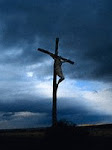The child in the photograph is Samuel Alexander Armas, and he was diagnosed with spina bifida. At 21 weeks old, he could not live if removed from his mother's womb. Dr. Joseph Bruner, practicing at Vanderbilt University Medical Center in Nashville, rose to the challenge. He performs these difficult operations while the baby is still in the womb. The procedure involves removing the uterus via C-section, and then the small incision you can see in the photograph is required to reac
 h the fetus.
h the fetus.Dr. Bruner has performed many similar operations, but as he completed the surgery on Samuel, something unusual happened. Samuel reached his tiny, but fully developed hand, through the incision and grasped the doctor's finger. Doctor Bruner is reported to have said that when his finger was grasped, it was the most emotional moment of his life. The operation was successful and Samuel was born healthy and perfectly normal.
At this point, you probably expect me to launch into a sermon or perhaps a rant concerning the many shades of gray that pro-life and pro-choice advocates have argued so eloquently. Instead, I would like you to take a moment and focus your attention of young Samuel's tiny hand, and see what this image says about hope, and trust, and the future.
Have a great life Samuel Alexander Armas. I have a feeling we are going to hear from you again.
If you would like to know more about Samuel’s story and Photographer Michael Clancy’s efforts to publicize this extraordinary event, you can follow this link. to justfacts.com.
.


























